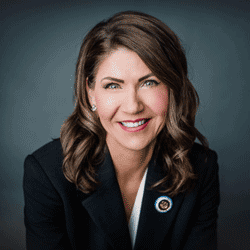

JOHNSON AND CRAIG LEAD CONGRESSIONAL BIOFUELS CAUCUS IN INTRODUCING LEGISLATION TO ENSURE TRANSPARENCY IN RFS SMALL REFINERY WAIVER PROCESS
Washington, D.C. – Today, U.S. Representatives Dusty Johnson (R-S.D.) and Angie Craig (D-MN) led Co-Chairs of the Congressional Biofuels Caucus in introducing bipartisan legislation to ensure transparency and predictability to the Environmental Protection Agency’s (EPA’s) small refinery exemption (SRE) process. The Renewable Fuel Standard Integrity Act would require small refineries to submit a petition for a Renewable Fuel Standard (RFS) hardship exemption by June 1st of each year, allowing EPA to properly account for exempted gallons in the annual Renewable Volume Obligations set each November. The bill would also increase transparency by mandating the public disclosure of data surrounding SREs – a process that has previously been carried out behind closed doors with little to no congressional oversight.
Johnson and Craig were joined in introducing the RFS Integrity Act by Representatives Rodney Davis (R-IL), Cindy Axne (D-IA), Mark Pocan (D-WI) and Adrian Smith (R-NE).
“No matter the administration, Congress should not sit on the sidelines while the intent of the Renewable Fuel Standard is being abused and manipulated,” said Representative Dusty Johnson. “The RFS Integrity Act adds accountability and transparency to the EPA Small Refinery Exemption process – something we should all agree upon. With each approved waiver, rural communities continue to suffer. This bill will ensure that volume obligations are met whether it’s a Republican or Democrat in the White House.”
“For the past several years, the Environmental Protection Agency has skirted Congressional oversight and prioritized the interests of Big Oil over family farmers in Minnesota, leaving ethanol producers at a distinct disadvantage,” said Representative Angie Craig. “This senseless, shortsighted policy has greatly impacted rural communities who depend on the Renewable Fuel Standard to help support their local economies – at a time when these communities are especially vulnerable due to the COVID-19 pandemic and economic crisis. Fortunately, our bipartisan bill would reverse that trend by helping to ensure that transparency, predictability and accountability are prioritized in the EPA’s waiver process moving forward – and that rural communities receive the support they deserve from the federal government in the years to come.”
“In recent years, the Renewable Fuel Standard has been weakened by Small Refinery Exemptions to the detriment of farmers and biofuels producers across America,” said Representative Rodney Davis. “Particularly in this struggling economy, where our biofuels producers continue to lack access to assistance, we should strengthen the RFS and ensure regulators adhere to it. That’s why I’m proud to introduce the RFS Integrity Act alongside my fellow House Biofuels Caucus co-chairs. Our legislation will help bolster the RFS through increased transparency to support our farmers and biofuels producers.”
“For the last four years, the EPA has abused its authority and given out dozens of small refinery waivers at the expense of farmers across the Midwest. These illegal waivers resulted in over 4 billion gallons of biofuels being removed from the market, reducing demand and creating uncertainty for producers,” said Representative Cindy Axne. “While I’m hopeful our new administration will uphold the RFS, new legislation is clearly needed to permanently increase transparency and accountability at the EPA. I’m proud to help introduce the RFS Integrity Act to ensure the EPA is always upholding the law.”
“I am proud to join my colleagues as an original sponsor of the RFS Integrity Act. For too long, big oil corporations have taken advantage of federal law at the expense of farmers and agricultural communities,” said Representative Mark Pocan. “This commonsense legislation will provide needed transparency and certainty for Wisconsin farmers at a time when they need it the most.”
“Now, more than ever, transparency in fuel markets is vital for our farmers and biofuels producers,” said Representative Adrian Smith. “The Renewable Fuel Standard Integrity Act will ensure all parties can make production decisions knowing they can rely on EPA to fairly and evenly enforce the RFS.”
By law, the RFS requires that the EPA make adjustments when determining future biofuels targets to account for waivers to ensure that the overall biofuels targets are not reduced by waivers. However, in recent years, the agency has not accounted for these waivers, which has undercut the demand for biofuels. And under the past administration, the EPA greatly expanded the number of small refinery hardship biofuel waivers that were issued. By issuing 85 waivers under former Administrator Scott Pruitt, the EPA saved the oil industry hundreds of millions of dollars while threatening rural economies and harming the biofuels industry at large.
The bipartisan bill is supported by the National Corn Growers, Growth Energy, Fuels America, the Renewable Fuels Association, the National Biodiesel Board, the American Soybean Association, POET, the American Farm Bureau Federation, the National Farmers Union and other groups dedicated to protecting and strengthening the Renewable Fuel Standard.
Below are statements in support of the Members’ bipartisan legislation:
“We applaud the introduction of the RFS Integrity Act and the strong bipartisan effort to restore integrity and transparency to the Renewable Fuel Standard,” said Growth Energy CEO Emily Skor. “The intent of the RFS is to blend more biofuels into our nation’s transportation fuel supply every year, not have oil companies use questionable tactics to delay and avoid their blending obligations, creating a tremendous amount of uncertainty for farmers, biofuels producers, and the entire fuel supply chain. Recent research has found that greenhouse gas emissions from corn ethanol are 46 percent lower than gasoline. As science on biofuels continues to update and highlight the increasing environmental benefits of ethanol over gasoline, it’s critical we restore the RFS to its original intent and harness the power of biofuels to immediately address climate change concerns and decarbonize our transportation fleet. We are grateful to Rep. Craig and Rep. Johnson for their continued leadership on this issue.”
“Given the accomplishments of the RFS program to date, EPA’s previous excessive and unreasonable use of the small refinery waiver dampened the prospects for reduced emissions and increased energy security,” said Zippy Duvall, President of the American Farm Bureau Federation. “The Renewable Fuel Standard Integrity Act ensures transparency through a fair and timely EPA waiver process going forward.”
“We are grateful to Reps. Angie Craig and Dusty Johnson for leading this effort to rein in EPA’s abuse of the small refinery exemption program. This bipartisan bill will prevent oil refiners from gaming the system and undercutting the Renewable Fuel Standard, something they have been doing a great deal of the past four years,” said Geoff Cooper, President and CEO of the Renewable Fuels Association. “Our hope is that this legislation and the new Administration will restore the integrity of the RFS and the law will be applied as it was intended. We applaud Reps. Craig and Johnson for working together to restore both transparency and integrity to the RFS.”
“The EPA’s abuse of small refinery waivers not only undermined the Renewable Fuel Standard but significantly impacted corn demand. NCGA appreciates Representatives Craig and Johnson and members of the Congressional Biofuels Caucus introducing the RFS Integrity Act,” said John Linder, President of the National Corn Growers Association. “Bringing transparency to the waiver process and establishing clear deadlines for refineries to apply for waivers will allow the EPA to avoid retroactive waivers and ensure the RFS is properly administered.”
“The RFS has positively linked soybean production to energy markets, allowing farmers to contribute to a cleaner fuel system and climate-friendly solutions. We have embraced this opportunity, so it is disheartening when small refinery exemption waivers are granted without transparency. It creates uncertainty in biodiesel markets and harms soybean farmers aiming to help,” said Kevin Scott, President of the American Soybean Association. “A strong RFS adds value to soybeans while also creating jobs, diversifying our fuel supply, and reducing our greenhouse gas emissions. We applaud Representatives Craig and Johnson on introducing the RFS Integrity Act, which will add much-needed transparency to the small refinery exemption waiver process at the EPA.”
“The Renewable Fuel Standard plays an important role in building new markets for farmers and creating good rural jobs. But in recent years, this crucial program has been undermined by refineries’ abuse of exemptions,” said Rob Larew, President of the National Farmers Union. “By fostering greater transparency in the way these exemptions are granted, the RFS Integrity Act would help prevent this abuse, thereby ensuring more stability in the program for farmers and biofuels producers. National Farmers Union warmly welcomes this beneficial piece of legislation and thanks Reps. Craig and Johnson for introducing it.”
“This is a commonsense step to ensure that RFS biomass-based diesel volumes are fully met each year and to prevent the demand destruction for biodiesel that we’ve seen since 2017,” said Kurt Kovarik, Vice president of Federal Affairs at the National Biodiesel Board. “Biodiesel producers are grateful to Representative Angie Craig and Representative Dusty Johnson for their leadership on this issue and strongly support Congress’ desire to restore integrity to the RFS program.”
“Representative Craig and Johnson’s bill is a fundamental step to ensure biofuel-blending volumes are fully met and will provide much-needed clarity for rural America,” said Joshua Shields, Senior Vice President of Government Affairs and Communications for POET. “Bioethanol producers and farmers deserve transparency in the exemption process and have a right to know the number of gallons of biofuel lost as a result of the waivers and to which companies they are granted.”
“ACE thanks Representatives Johnson and Craig for leading the reintroduction of this bipartisan legislation to ensure the statutory volumes of the Renewable Fuel Standard are enforced by restoring transparency and integrity to EPA’s handling of small refinery exemptions,” said Brian Jennings, CEO of the American Coalition for Ethanol. “This legislation is necessary because under President Trump, EPA brazenly granted nearly 90 waivers for small refineries, erasing over 4 billion gallons from the RFS volumes established by Congress. As of today, 66 additional refinery waivers are pending.”
###






